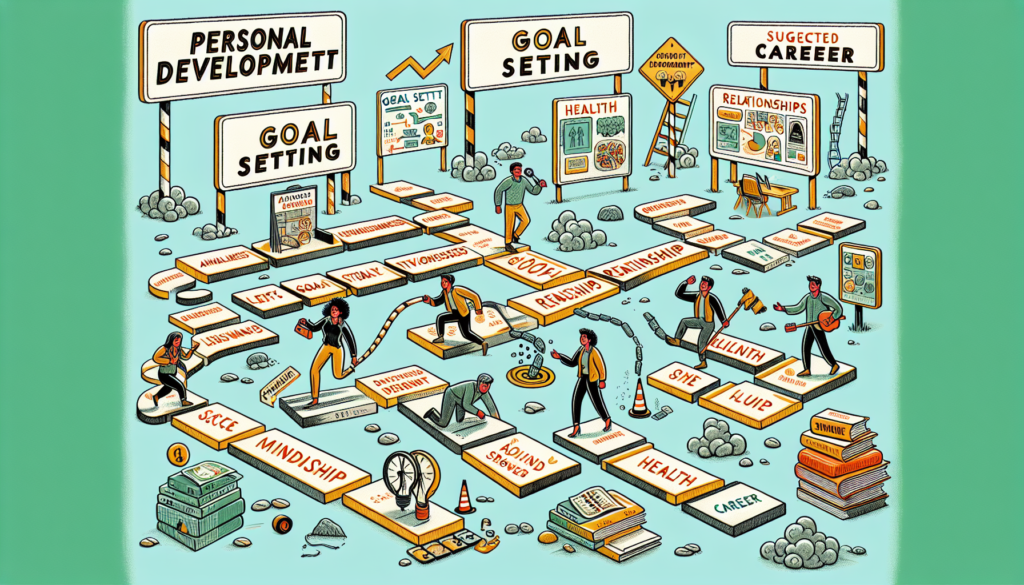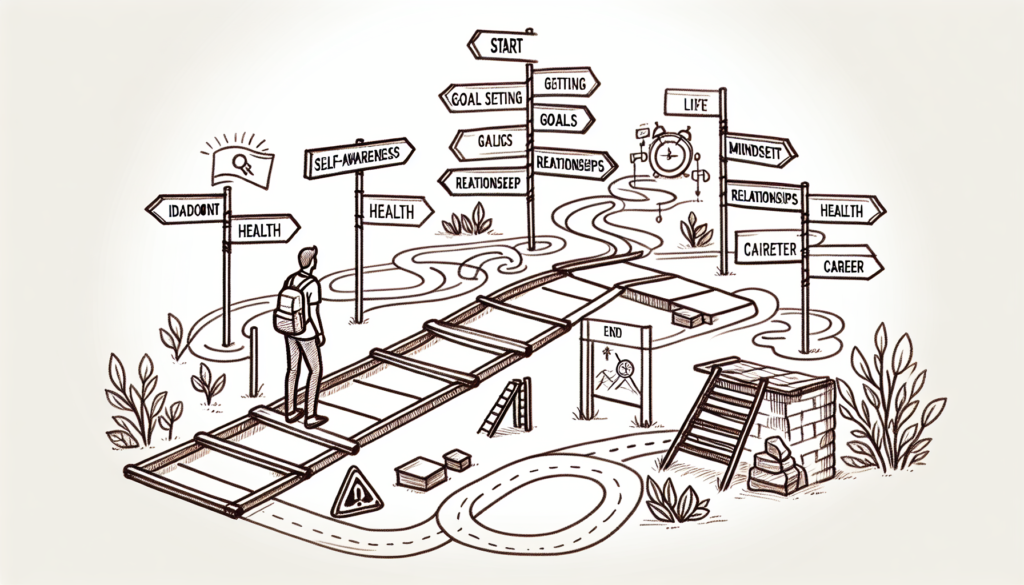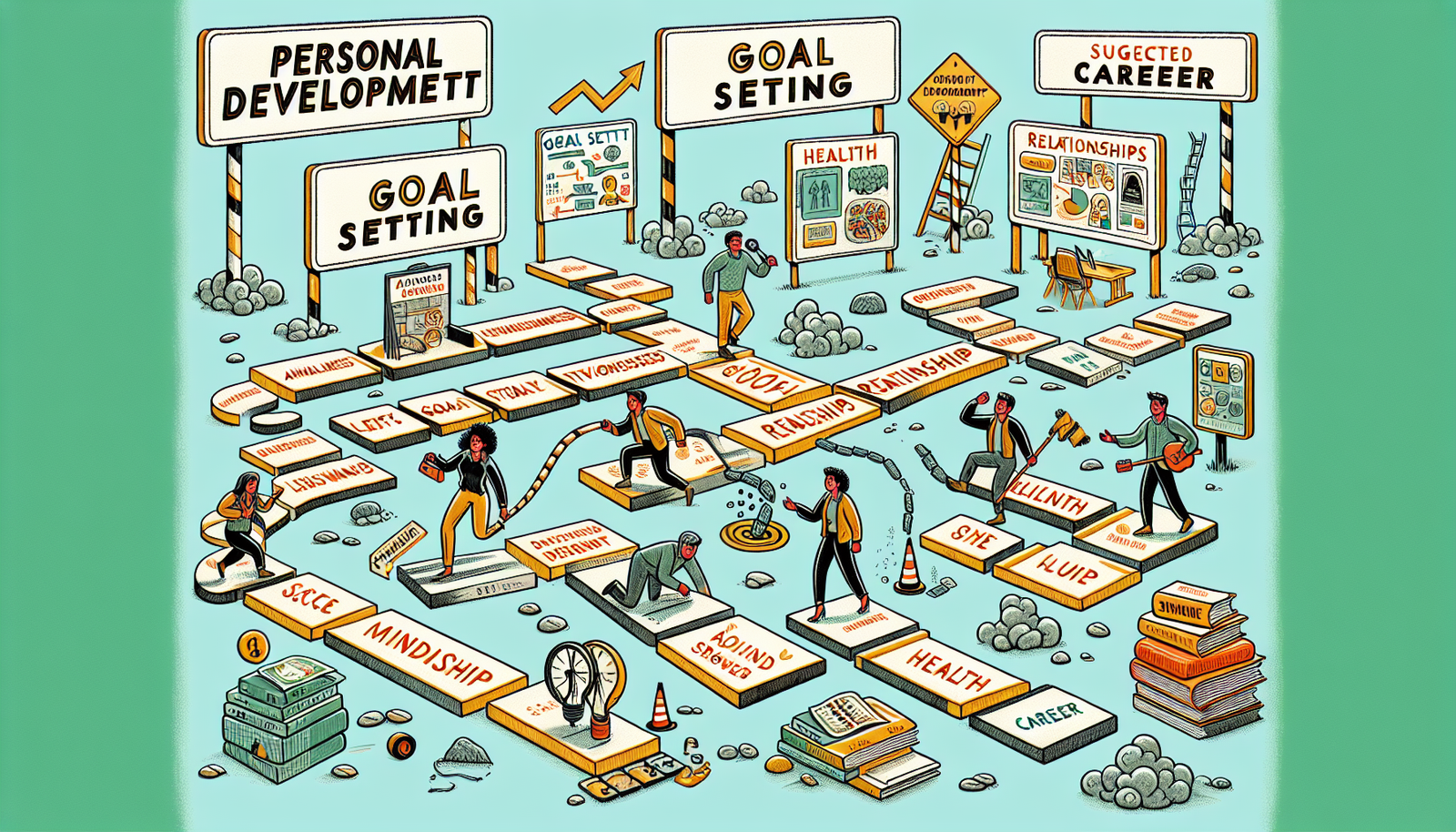Are you ready to unleash your full potential? If so, you’re in the right place! In this article, we’ll take you on a journey towards personal development and growth. We’ll provide you with a comprehensive roadmap that will guide you through various aspects of self-improvement, helping you discover your strengths, conquer your weaknesses, and ultimately become the best version of yourself. So, get ready to embark on this incredible adventure of self-discovery and watch as you unlock your true potential. Let’s get started!

Setting Personal Development Goals
Setting personal development goals is an essential step towards unlocking your full potential. By defining your vision, identifying your values, and setting S.M.A.R.T. (Specific, Measurable, Achievable, Relevant, Time-bound) goals, you lay the foundation for growth and self-improvement.
Define your vision
To start the personal development journey, take some time to envision your ideal future. What do you want to achieve? What kind of person do you want to become? By clarifying your vision and understanding your long-term aspirations, you can create meaningful goals that align with your true desires.
Identify your values
Understanding your values is crucial in setting personal development goals that are in line with who you are. Reflect on what matters most to you in life. Is it creativity, compassion, or ambition? Identifying your core values will guide you in making decisions, choosing activities, and pursuing goals that resonate with your authentic self.
Set S.M.A.R.T. goals
Once you have a clear vision and know your values, it’s time to set goals that are specific, measurable, achievable, relevant, and time-bound. Specific goals provide direction, measurable goals allow for tracking progress, achievable goals are realistic and within reach, relevant goals align with your vision and values, and time-bound goals have a deadline.
Break down long-term goals into smaller milestones
To make your personal development goals more manageable and attainable, break them down into smaller milestones. By focusing on these milestones along the way, you ensure progress and stay motivated. Celebrate each milestone as it brings you closer to your long-term objectives and helps you maintain momentum.
Developing a Growth Mindset
Adopting a growth mindset is a powerful tool for personal development. It involves embracing challenges, viewing failures as learning opportunities, cultivating a positive attitude, and seeking feedback and constructive criticism.
Embrace challenges
Challenges are opportunities for growth and learning. Rather than avoiding them, embrace them. Step out of your comfort zone and take on new experiences that push your boundaries. By challenging yourself, you develop new skills, expand your knowledge, and discover hidden strengths.
View failures as learning opportunities
Failure is a natural part of the learning process. Instead of being discouraged by failures, use them as stepping stones towards success. Analyze what went wrong, learn from your mistakes, and adjust your approach. Embracing failure as a chance to learn will help you develop resilience and find solutions to overcome obstacles.
Cultivate a positive attitude
A positive attitude is the key to unlocking your full potential. Cultivate optimism, gratitude, and resilience in your daily life. Focus on the positives, even in challenging situations. By approaching life with a positive mindset, you’ll be better equipped to handle setbacks, maintain motivation, and attract positive experiences.
Seek feedback and constructive criticism
Feedback is invaluable in personal development. Actively seek feedback from trusted mentors, friends, and colleagues. Listen to their perspectives, absorb the constructive criticism, and use it to improve. Embracing feedback allows you to gain new insights, identify areas for growth, and refine your skills and qualities.
Increasing Self-Awareness
Self-awareness is a fundamental aspect of personal development. By reflecting on your strengths and weaknesses, taking personality and strengths assessments, practicing mindfulness and self-reflection, and seeking feedback from others, you can enhance your self-awareness and make informed decisions regarding your personal growth.
Reflect on your strengths and weaknesses
Take time to reflect on your strengths and weaknesses. Acknowledge your unique talents and abilities as well as areas where you can improve. By understanding your strengths, you can leverage them to excel in your endeavors. Similarly, by recognizing your weaknesses, you can work on overcoming them or seeking support.
Take personality and strengths assessments
Personality and strengths assessments provide valuable insights into your personality traits, preferences, and areas where you excel. By taking these assessments, such as the Myers-Briggs Type Indicator (MBTI) or the CliftonStrengths assessment, you can gain self-awareness and tailor your personal development journey to align with your natural inclinations.
Practice mindfulness and self-reflection
Mindfulness and self-reflection are powerful tools for personal growth. Take moments throughout your day to pause, become aware of your thoughts and emotions, and reflect on your experiences. This practice cultivates self-awareness, helps you understand your motivations and behaviors, and allows you to make conscious choices in alignment with your goals and values.
Seek feedback from others
Feedback from others provides valuable external perspectives on your strengths, weaknesses, and areas for improvement. Seek feedback from trusted individuals in your life, such as mentors, friends, or colleagues. Be open to receiving feedback and use it as an opportunity for growth and self-improvement.
Improving Time Management
Effective time management is essential for maximizing productivity and achieving personal development goals. By setting priorities, managing tasks, creating schedules, eliminating time-wasting activities, and using productivity techniques and tools, you can optimize your time and make meaningful progress.
Set priorities and manage your tasks
Identify your most important tasks and set priorities accordingly. Determine which activities align with your goals and values, and focus your time and energy on them. Develop effective task management strategies, such as creating to-do lists, breaking down tasks, and utilizing productivity frameworks like the Eisenhower Matrix.
Create a schedule and stick to it
Establishing a schedule helps you structure your day and allocate time to different activities. Create a routine that incorporates dedicated time for personal development, work, leisure, and self-care. Stick to your schedule as much as possible to maintain consistency and maximize productivity.
Eliminate time-wasting activities
Identify activities that eat up your time without contributing to your personal growth or priorities. This might include excessive social media use, aimless web browsing, or engaging in unproductive conversations. Minimize or eliminate these activities to make room for tasks that align with your goals.
Use productivity techniques and tools
Various productivity techniques and tools exist to help you manage your time efficiently. Explore methods like the Pomodoro Technique to enhance focus and productivity, or utilize digital tools and apps that enable you to track your time, set reminders, and create task lists. Find what works best for you and integrate these resources into your daily routine.

Enhancing Emotional Intelligence
Emotional intelligence plays a crucial role in personal and interpersonal growth. By developing self-awareness of emotions, managing and expressing emotions effectively, empathizing with others, and resolving conflicts, you can enhance your emotional intelligence and build healthier relationships.
Develop self-awareness of emotions
Take the time to recognize and understand your own emotions. Be aware of how certain situations, people, or thoughts trigger specific emotional responses in you. Self-awareness allows you to regulate your emotions and make conscious choices rather than react impulsively.
Manage and express emotions effectively
Once you are aware of your emotions, focus on managing and expressing them effectively. Practice emotional regulation techniques such as deep breathing, journaling, or seeking support from trusted individuals. Communicate your emotions assertively and respectfully to build stronger connections with others.
Empathize with others and show empathy
Empathy is the ability to understand and share the feelings of others. Cultivate empathy by actively listening to others, putting yourself in their shoes, and recognizing their emotions. Showing empathy fosters understanding, compassion, and healthier relationships.
Resolve conflicts and build healthy relationships
Conflict resolution is a skill that contributes to personal and relationship development. Learn strategies for effective communication, active listening, and problem-solving. Embrace open and honest conversations, find common ground, and seek win-win solutions to resolve conflicts and build harmonious relationships.
Building Resilience and Coping Skills
Resilience and coping skills are essential for navigating challenges and setbacks in life. By developing a resilient mindset, learning stress management techniques, building social support systems, and practicing self-care and relaxation techniques, you can bounce back stronger and maintain well-being.
Develop a resilient mindset
Cultivate a mindset of resilience by viewing challenges as opportunities for growth rather than insurmountable hurdles. Embrace setbacks as learning experiences and trust in your ability to overcome obstacles. Focus on your strengths and past successes, and cultivate optimism in the face of adversity.
Learn stress management techniques
Stress is a common part of life, but effective stress management is crucial for personal well-being. Explore stress reduction techniques such as exercise, deep breathing, mindfulness meditation, or engaging in hobbies and activities that bring you joy. Find healthy outlets for stress and practice self-care regularly.
Build social support systems
Having a strong support system can significantly impact your resilience and ability to cope with challenges. Surround yourself with supportive individuals who encourage your personal growth and provide emotional support. Join communities or groups aligned with your interests or goals to amplify your support network.
Practice self-care and relaxation techniques
Allocating time for self-care is essential for personal development and overall well-being. Engage in activities that nurture your physical, mental, and emotional health. This might include hobbies, spending time in nature, practicing mindfulness or yoga, or indulging in activities that bring you joy and relaxation.
Improving Communication Skills
Effective communication is vital for personal development and building meaningful connections. By practicing active listening, enhancing verbal and non-verbal communication, being assertive in expressing your thoughts, and improving written communication skills, you can strengthen your communication abilities.
Practice active listening
Active listening involves fully engaging in a conversation and giving your undivided attention to the speaker. Show interest, maintain eye contact, ask clarifying questions, and avoid interrupting. By practicing active listening, you demonstrate respect and enhance the quality of your interactions.
Enhance verbal and non-verbal communication
Developing clear and effective verbal and non-verbal communication skills is essential for conveying your thoughts and understanding others. Pay attention to your body language, tone of voice, and choice of words. Practice assertiveness and appreciate the impact of non-verbal cues in your communication.
Be assertive in expressing your thoughts
Assertiveness allows you to express your thoughts, needs, and boundaries confidently and respectfully. Practice assertive communication by conveying your messages clearly, using “I” statements, and maintaining a calm and composed demeanor. Assertiveness facilitates open and honest communication, fostering understanding and collaboration.
Improve written communication skills
Written communication skills are vital in various aspects of personal and professional life. Enhance your written communication by refining your grammar and punctuation, organizing your thoughts cohesively, and adapting your style to the intended audience. Regular practice and seeking feedback can polish your written communication abilities.
Expanding Knowledge and Skills
Continual learning and acquiring new knowledge and skills are essential for personal development. By staying curious, seeking opportunities for professional development, building a diverse range of competencies, and staying up-to-date with industry trends, you can broaden your horizons and unlock new possibilities.
Stay curious and embrace lifelong learning
Cultivate a curious mindset and embrace lifelong learning. Seek out new experiences, explore different subjects, and ask questions. Engage in learning activities such as reading, attending workshops or webinars, and participating in online courses or communities that fuel your intellectual curiosity.
Seek opportunities for professional development
Professional development plays a crucial role in personal growth and career advancement. Identify areas for improvement in your chosen field and seek out opportunities for growth. This might include attending conferences, pursuing certifications, or seeking mentorship from industry experts. Embrace professional development as a means to expand your knowledge and skills.
Build a diverse range of competencies
Instead of limiting yourself to a single skill set, strive to develop a diverse range of competencies. Identify complementary skills that expand your versatility and enhance your marketability. Embrace interdisciplinary learning and explore areas of interest beyond your immediate field.
Stay up-to-date with industry trends
Remaining informed about industry trends and developments is essential for personal and professional growth. Stay updated through industry publications, newsletters, podcasts, or networking with professionals in your field. By staying ahead of the curve, you can adapt to changes, identify new opportunities, and expand your knowledge base.
Developing Healthy Habits
Developing and maintaining healthy habits is foundational to personal development. By prioritizing physical well-being through regular exercise, maintaining a balanced diet and healthy eating habits, getting adequate sleep and rest, and practicing stress-reducing techniques, you can support your overall well-being.
Exercise regularly and prioritize physical well-being
Regular exercise is not only beneficial for physical health but also for mental and emotional well-being. Find activities that you enjoy and incorporate them into your routine. Engaging in regular exercise boosts energy levels, improves mood, and enhances overall vitality.
Maintain a balanced diet and healthy eating habits
Eating a balanced diet is crucial for optimal health and personal development. Prioritize nutrient-dense foods, such as fruits, vegetables, lean proteins, and whole grains. Avoid excessive consumption of processed foods, sugar, and unhealthy fats. Cultivate mindful eating habits and listen to your body’s hunger and fullness cues.
Get adequate sleep and rest
Quality sleep is essential for cognitive function, emotional well-being, and physical health. Prioritize getting enough sleep by establishing a regular sleep schedule, creating a calming bedtime routine, and creating an optimal sleep environment. Ensure you allocate time for rest and relaxation throughout your day, allowing your mind and body to recharge.
Practice stress-reducing techniques
Stress can hinder personal development and overall well-being. Explore stress-reducing techniques such as deep breathing, meditation, yoga, or engaging in hobbies that promote relaxation. Find techniques that work best for you and incorporate them into your daily routine to manage stress effectively.
Continual Evaluation and Adjustment
Personal development is an ongoing journey that requires continual evaluation and adjustment. Regularly assess your progress and achievements, adjust goals and strategies as needed, seek feedback and learn from setbacks, and celebrate milestones and successes along the way.
Regularly assess your progress and achievements
Take the time to assess your progress regularly. Reflect on the goals you have set and evaluate how far you have come. Celebrate your achievements and identify areas where you may need to make adjustments or redirect your efforts.
Adjust goals and strategies as needed
Personal development is dynamic, and as you grow and change, your goals and strategies may need adjustment. Be receptive to change and assess whether your current goals and strategies align with your evolving vision. Modify them as necessary to stay on track and continue progressing.
Seek feedback and learn from setbacks
Feedback and setbacks are valuable sources of learning and growth. Seek feedback from others and reflect on the setbacks you may encounter along the way. Use these experiences as opportunities for self-improvement, make necessary adjustments, and learn from them to approach future challenges more effectively.
Celebrate milestones and successes
Personal development is a journey that should be celebrated along the way. Take the time to acknowledge and celebrate your milestones and successes, no matter how small they may be. Celebrating achievements reinforces motivation, boosts confidence, and highlights the progress you have made on your personal development roadmap.
In conclusion, personal development is a lifelong journey that encompasses various aspects of growth and self-improvement. By setting personal development goals, developing a growth mindset, increasing self-awareness, improving time management, enhancing emotional intelligence, building resilience and coping skills, improving communication skills, expanding knowledge and skills, developing healthy habits, and continually evaluating and adjusting, you can unlock your full potential and lead a fulfilling life. Embrace these strategies and incorporate them into your daily life, and watch as you unleash your full potential.


